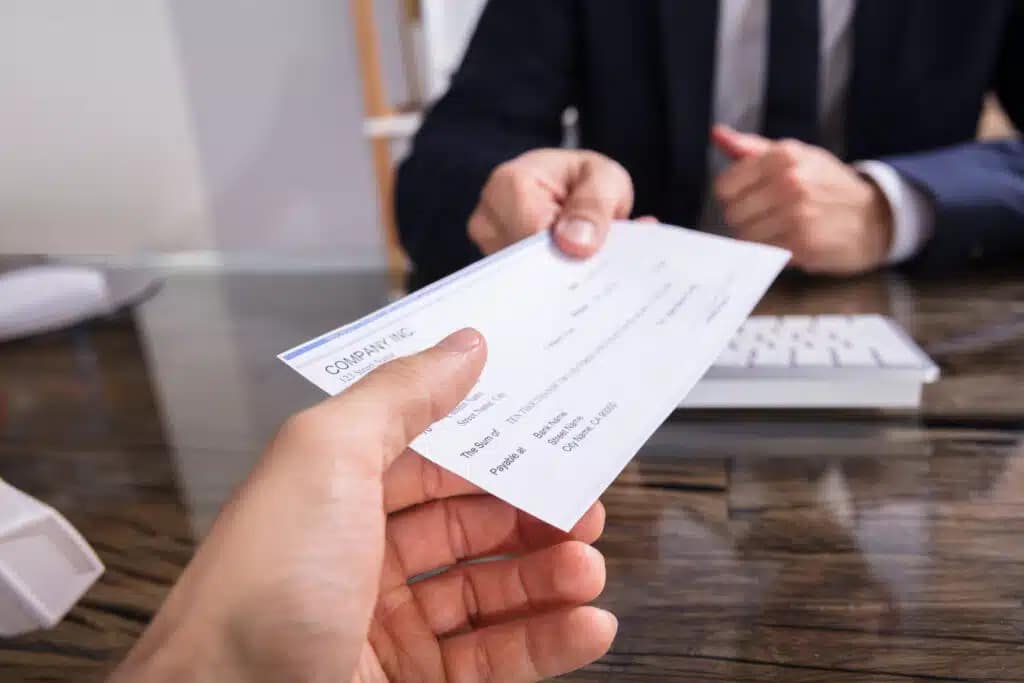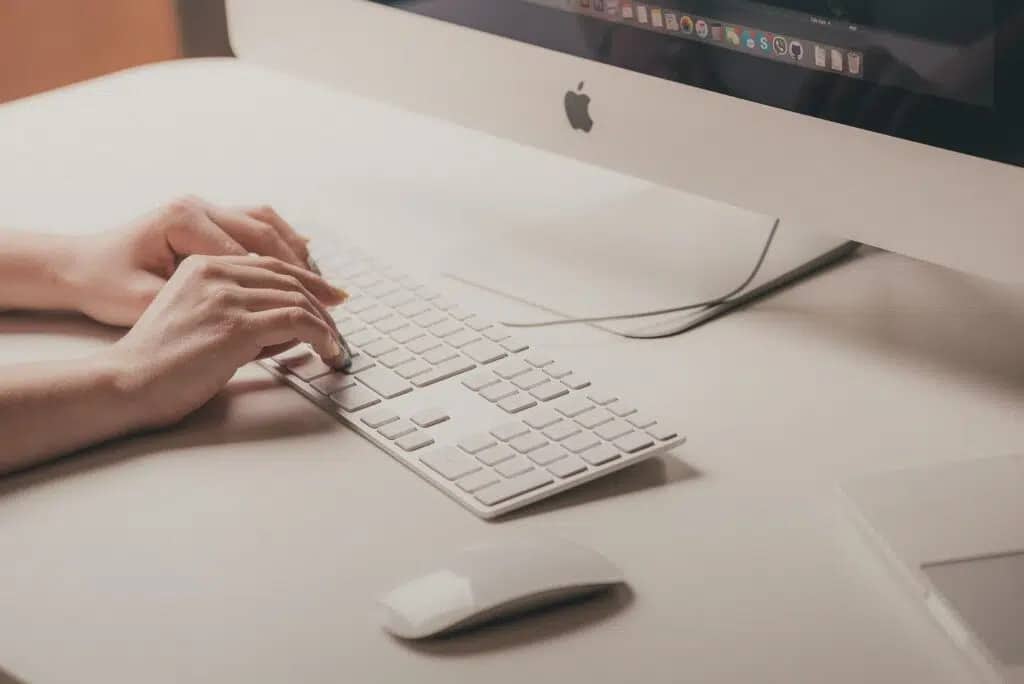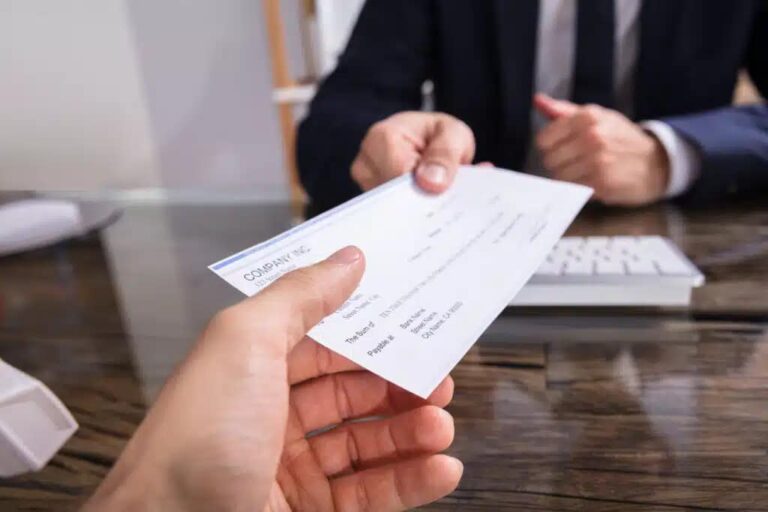Many employers pay their employees by direct deposit into their bank accounts, but some businesses still pay with physical checks. If you get paid by paper check, you can cash or deposit it.
Whether or not you have a bank account, you have options to free up your funds for bills, entertainment, or to send money home to loved ones.
What’s the difference between cashing a check and depositing a check?
When you receive a personal check, a paycheck, or a government check, you can either cash it or deposit it.
Cashing a check means you hand the check over to a financial institution or check cashing service, and they give you the check amount as cash in return.
Depositing a check means you place the money into a financial account or onto a prepaid card for later use.
When you’re ready to use the money, you can withdraw cash from the account, use a debit card, or write a check. Your options will depend on the type of account you have.
If you cash a check, you’ll receive the payment right away. If you deposit a check, you may have to wait a few days for the check to clear.
How do you cash checks with a bank account?

If you have a bank account, such as a checking account or savings account, you can easily cash or deposit your check through your bank.
To cash your check, you’ll need to visit a bank branch.
To deposit your check, you can visit a bank branch, use an ATM, or make a mobile bank deposit.
Cashing a check at a bank branch
To cash a check, you’ll need to go to a local bank branch location. Bring the check and a valid photo identification with you.
Financial institutions have different policies regarding valid IDs, but government-issued identification—like passports and driver’s licenses—are usually accepted.
If you’re in doubt about which forms of identification your bank accepts, visit their website or give them a quick call to find out.
Depending on your bank, you might also need to have your bank card with you. If you don’t have it, they may ask you to fill out additional forms to cash your check.
Cashing a check in person will usually go as follows:
- Go to the bank teller with your photo ID, check, and bank card.
- Show the teller your ID and give them your debit card if they ask for it.
- Endorse the check by signing the back of the check in front of the teller. If possible, don’t sign the check before you arrive at the bank for security reasons.
- The bank teller will count the bills and place them in front of you. Feel free to double-check your money by counting it yourself before leaving the bank.
Depositing a check with your bank
If you want to deposit your check instead, you have multiple options. First, you can either visit a bank location and speak to a teller, just like you do for cashing a check. You can also use your bank’s ATM to deposit your check into your account.
But the easiest way to deposit your check is through mobile banking.
Using a mobile device, such as a smartphone or tablet, take a photo of the front and back of the check through your bank’s mobile app. You’ll get an email after making your deposit confirming the transaction.
Depending on the type of check, it may clear as soon as within one business day or after a few days.
After you’ve successfully deposited your check, many banks and credit unions recommend keeping your physical check as a record for a certain period.
When using mobile banking, there may be a limit to how much money you can deposit each day.
How do you cash checks without a bank account?

The World Bank reported that there were 1.7 billion people who didn’t have a bank account in 2017. If you’re among this group, don’t worry. There are several ways to cash checks without a bank account.
Cash the check at the issuing bank
One option is to cash the check at the issuing bank. The front of the check will have the name of the bank that issued it. Many banks will cash their own checks, even if you don’t have an account with them.
Even though many banks will provide this service to non-customers, they are not obligated to. for people who are not customers. Also, the bank may charge a fee to cash the check.
Use a retailer with a check-cashing service
Several retailers and grocery stores—like Walmart, Kmart, Kroger, and 7-Eleven—offer check cashing services for a fee. The fee can vary depending on the retailer you use, so be sure to find out about the costs before making the transaction.
Go to a check cashing store
A check cashing center, like ACE Cash Express or Check Center, will cash your check immediately.
Most check cashing stores take all types of checks, including personal checks, but typically charge a percentage of the check amount. Depending on the type of check, these charges may range from around 2% to 15%.
These fees add up quickly, so a check cashing center should be considered a last resort.
Deposit the check to a prepaid debit card
With a prepaid debit card, your spending is only limited by the amount of money you deposit. If you work on a cruise ship or abroad, your employer might have set up a prepaid Visa or Mastercard debit card for direct deposit.
Ask a bank representative if they offer an option to deposit a check to your prepaid card through their app. The process is similar to cashing a check online. Depending on your card issuer, there could be fees for depositing a check.
It’s also likely you will have to wait a few business days for the funds to clear.
How long does it take before a check expires?

If you find yourself in a situation where you don’t have the opportunity to cash a check you received, you might be wondering how long a check is valid. It depends on the type of check you have.
- Business, personal, and payroll checks: These are usually valid for six months. After six months, the check can become “stale-dated.” Once a check is stale-dated, it’s up to the bank’s discretion whether it will honor or reject it.
- Cashier’s checks and money orders: These have no official expiration date. However, if you hold on to these for too long, they can be declared as escheated checks. An escheated check is turned over to the state as unclaimed property. The rules vary a bit from country to country.
- American Express Travelers Checks: As of this writing, these do not expire.
You can cash or deposit checks with or without a bank account
As you can see, there are a lot of ways to turn a paper check into cash. You can get cash immediately by going to a check cashing center or retailer, but you’ll have to pay fees out of the check amount.
